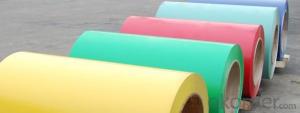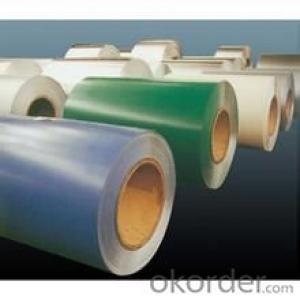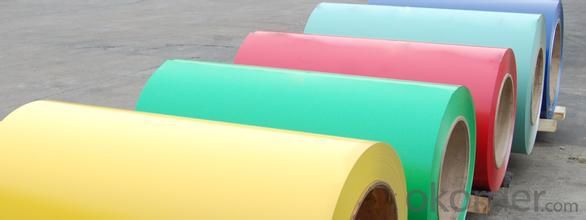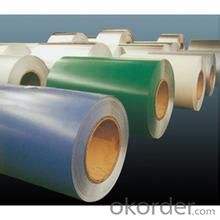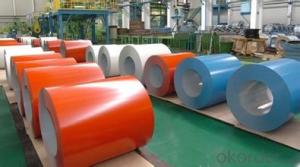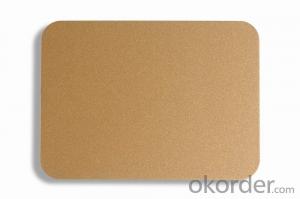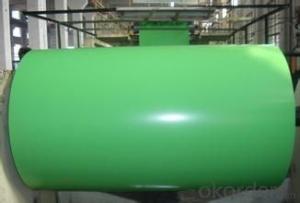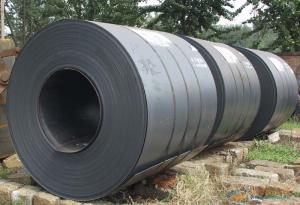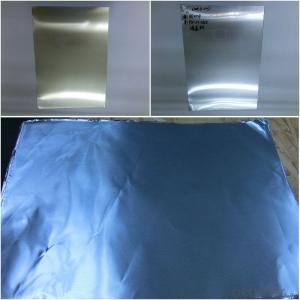Full-Coloured Rolled Black Aluminum Coil
- Loading Port:
- China Main Port
- Payment Terms:
- TT OR LC
- Min Order Qty:
- -
- Supply Capability:
- -
OKorder Service Pledge
OKorder Financial Service
You Might Also Like
Aluminium is a relatively soft, durable, lightweight, ductileand malleablemetalwith appearance ranging from silvery to dull gray, depending on the surfaceroughness. It is nonmagnetic and does not easily ignite. A fresh film ofaluminium serves as a good reflector (approximately 92%) of visible lightand an excellent reflector (as much as 98%) of medium and far infraredradiation. The yield strength of pure aluminium is 7–11 MPa,while aluminium alloys have yield strengths ranging from200 MPa to 600 MPa. Aluminium has about one-third the densityand stiffness of steel. It is easily machined,cast, drawn and extruded.
Aluminium alloys (or aluminum alloys; see spellingdifferences) are alloysin which aluminium(Al) is the predominant metal. The typical alloying elements are copper, magnesium,manganese,silicon,tin and zinc. There are twoprincipal classifications, namely casting alloys and wrought alloys, both of which are furthersubdivided into the categories heat-treatableand non-heat-treatable. About 85% of aluminium is used for wrought products,for example rolled plate, foils and extrusions.Cast aluminium alloys yield cost-effective products due to the low meltingpoint, although they generally have lower tensile strengthsthan wrought alloys. The most important cast aluminium alloy system is Al–Si,where the high levels of silicon (4.0–13%) contribute to give good castingcharacteristics. Aluminium alloys are widely used in engineering structures andcomponents where light weight or corrosion resistance is required
Specification:
Alloy: AA1050, 1060, 1100,AA3003, 3005, 3015, 5052, 5754, 5083,8011, etc
Temper: H14/16/18/22/24/32,HO etc.
Thickness: 0.2mm—100mm
Width: 100mm—2300mm (Can be slitted)
Inner Diameter:508MM
Coil Weight:500kg-3000kg(Max.)
Application:Foil stock, Circles, Roofing, Can stock, Marine plate,Anti-slipery purpose in vehicles, packing and appliance.
Features:
1. Excellent quality of products
2. Quick delivery
3. Best service to clients
4. BV,SGS avalible
5. No buckle o waveness
6. Tension leveling
7. Certificate of Origin
8. Form A,E
Packaging Detail:
Carton ,Woodenpallet with plastic protection packing ,standard seaworthy packing or as yourrequest.
Production Capacity:
AnnualProduction capacity of 600,000 tons.
Products areexported to United States, Canada, U.A.E, Brazil, Mexico,Thailand, Vietnam,Nigeria etc, over 100 countries andregions all over the world.
Production Line:
CNBM aluminumproduction base is comprised of 18 aluminumannealers, 10 coil and foilmills, 4 continuous production lines, 2hot rolling production line and 3prepainted lines.
FAQ:
1. What is the form of payment?
Normally 30% TT, L/C
2. Type of quotation?
FOB, CFR, CIF
3. Port of loading?
Shanghai port
4. Delivery time?
30 days after client’s deposit
- Q: What is the maximum temperature resistance of aluminum coils?
- The maximum temperature resistance of aluminum coils can vary depending on their specific alloy composition and application. However, in general, aluminum coils can withstand temperatures up to around 600 degrees Fahrenheit (315 degrees Celsius) before their structural integrity and performance may be compromised.
- Q: What are the steps to properly store an unused aluminum coil to prevent it from rusting?
- <p>To store an unused aluminum coil and prevent rusting, follow these steps: 1. Clean the coil thoroughly to remove any dirt or moisture. 2. Apply a thin layer of a rust inhibitor or light oil to the surface. 3. Wrap the coil in a protective plastic or wax paper to prevent moisture and air exposure. 4. Store the coil in a cool, dry place away from direct sunlight and humidity. 5. Ensure the storage area is well-ventilated to prevent condensation. 6. Periodically check the coil for any signs of rust and clean if necessary. By following these steps, you can effectively prevent rusting and maintain the quality of the aluminum coil.</p>
- Q: The question asks if magnetic induction can be used to inspect the quality of an aluminum coil.
- <p>No, you cannot use magnetic induction to inspect the quality of an aluminum coil. Magnetic induction is a method used to detect flaws or discontinuities in ferromagnetic materials, such as steel, by inducing eddy currents. Aluminum is not a ferromagnetic material, so it does not retain magnetism or support the formation of eddy currents in the same way. Instead, other non-destructive testing methods like ultrasonic testing or radiographic testing may be more appropriate for inspecting the quality of aluminum coils.</p>
- Q: Is it appropriate to use a wire brush for cleaning an aluminum coil?
- <p>Using a wire brush to clean an aluminum coil is not recommended. Wire brushes can cause scratches and damage the surface of the aluminum, which can lead to corrosion over time. Instead, use a soft cloth or sponge with a mild cleaning solution to gently clean the coil. This will prevent any damage to the aluminum while effectively removing dirt and debris.</p>
- Q: Are there any specific regulations or standards for aluminum coil production?
- Yes, there are specific regulations and standards for aluminum coil production. These regulations and standards are put in place to ensure the quality, safety, and sustainability of the production process. One of the most important standards for aluminum coil production is the American Society for Testing and Materials (ASTM) International standard. ASTM B209 is the standard specification for aluminum and aluminum-alloy sheet and plate, which includes the requirements for aluminum coil production. This standard specifies the chemical composition, mechanical properties, and other technical requirements that the aluminum coil must meet. In addition to ASTM standards, there are also regulations and standards set by regulatory bodies such as the International Organization for Standardization (ISO) and the Occupational Safety and Health Administration (OSHA). ISO 9001 is a widely recognized standard for quality management systems, and ISO 14001 is for environmental management systems. These standards provide guidelines and requirements for the production process to ensure quality, environmental responsibility, and worker safety. Furthermore, specific regulations may vary by country or region. For example, in the United States, the Environmental Protection Agency (EPA) regulates the emissions and waste disposal associated with aluminum coil production through the Clean Air Act and the Resource Conservation and Recovery Act (RCRA). These regulations aim to minimize the environmental impact of the production process. Overall, the regulations and standards for aluminum coil production are in place to uphold the quality, safety, and environmental sustainability of the industry. Compliance with these regulations and standards is essential for manufacturers to ensure that their products meet the required specifications and are produced in a responsible manner.
- Q: What are the common surface treatments for aluminum coils in the construction industry?
- In the construction industry, aluminum coils are widely used due to their lightweight, durability, and corrosion resistance. To enhance their performance and aesthetic appeal, various surface treatments are applied to aluminum coils. Some of the common surface treatments for aluminum coils in the construction industry include: 1. Anodizing: Anodizing is a widely used surface treatment that involves creating an oxide layer on the aluminum surface. This process provides enhanced corrosion resistance, improves weather resistance, and allows for coloring options. 2. Powder coating: Powder coating is a popular surface treatment method where a dry powder is electrostatically applied to the aluminum coil and then cured under heat. This results in a durable, smooth, and attractive finish that is resistant to chipping, fading, and scratching. 3. PVDF coating: Polyvinylidene fluoride (PVDF) coating is a high-performance coating that provides excellent weather resistance and color retention. It is commonly used in architectural applications where long-term durability and aesthetic appeal are desired. 4. Paint coating: Traditional liquid paint coatings are also applied to aluminum coils, providing a wide range of color options and finishes. Paint coatings offer good corrosion resistance and can be customized to meet specific design requirements. 5. Brushed finish: Brushing the aluminum surface creates a textured finish that gives a unique appearance to the coils. The brushed finish can be achieved using mechanical or chemical processes, enhancing the aesthetic appeal of the aluminum coils. 6. Laminating: Laminating is a surface treatment method where a layer of protective film or laminate is applied to the aluminum coil. This protects the coil from scratches, stains, and other damage during handling, transportation, and installation. These surface treatments not only enhance the durability and performance of aluminum coils but also provide options for customization, allowing architects and designers to achieve their desired aesthetics while ensuring long-lasting performance in construction applications.
- Q: This question asks about the impact of aluminum coils on the quality of food when it is stored. It seeks to understand if there are any changes in the food's properties due to the presence of aluminum coils.
- <p>Aluminum coils themselves do not directly affect the quality of food during storage. They are often used in the packaging industry for their excellent barrier properties against light, oxygen, and moisture, which can help preserve the freshness and quality of food by preventing spoilage and oxidation. However, it's important to note that aluminum does not interact with food in a way that alters its taste or nutritional content. Any potential health concerns related to aluminum exposure are more associated with the manufacturing process and not with the storage of food in aluminum-coiled packaging.</p>
- Q: I HEARD THAT ALUMINUM POWDER TIGHTEN YOUR VAGINA BUT WHERE DO I BUY IT AND HAVE ANY ONE HEARD OF BEYDARY PILLS, I HEARD THEY TIGHTEN YOUR VAGINA ALSO AND WHERE CAN I BUY THEM
- You can buy aluminum powder online but I assure you completely it will not help. And aluminum can be toxic if it gets into your bloodstream in too large an amount. I also think you must mean bayberry as that is used to reduce bleeding and discharge in the vaginal area. But it doesn't tighten anything. There isn't anything you can put on there to change it.. do kegel exercises is your real only hope.
- Q: Can aluminum coils be used in the production of aluminum composite roofs?
- Aluminum composite roofs can indeed utilize aluminum coils. Due to their durability, lightweight composition, and corrosion resistance, aluminum coils are frequently employed in the manufacturing process of aluminum composite roofs. These coils can be effortlessly molded and arranged into the desired roof profile, resulting in a smooth and visually pleasing final product. Furthermore, aluminum possesses exceptional thermal and sound insulation qualities, rendering it an optimal selection for roofing purposes. Its remarkable strength-to-weight ratio additionally bolsters the overall structural stability of the roof. In summary, the utilization of aluminum coils in the production of aluminum composite roofs furnishes a dependable and enduring roofing solution.
- Q: What benefits does anodized aluminum offer when compared to regular aluminum coils?
- <p>Anodized aluminum coils offer several advantages over standard ones. They have enhanced corrosion resistance due to the protective oxide layer formed during the anodizing process. This layer also improves wear resistance and increases the coil's durability. Anodized coils can be easily colored, providing a wide range of aesthetic options without affecting the material's performance. Additionally, the anodized surface is more resistant to scratches and can maintain a polished appearance longer. Overall, anodized aluminum coils are more robust, visually appealing, and longer-lasting compared to standard aluminum coils.</p>
Send your message to us
Full-Coloured Rolled Black Aluminum Coil
- Loading Port:
- China Main Port
- Payment Terms:
- TT OR LC
- Min Order Qty:
- -
- Supply Capability:
- -
OKorder Service Pledge
OKorder Financial Service
Similar products
Hot products
Hot Searches
Related keywords
